Did you know that drowning is one of the leading causes of accidental deaths for children under five? As a parent, you can't afford to take any chances when it comes to pool safety. In 2024, several pool safety alarms have emerged as top choices, each designed to enhance protection for your family. From high-tech options with app connectivity to reliable traditional models, there's a range of products that cater to varying needs. Let's explore which five alarms stand out this year and why they might be essential for your home.
Table of Contents
- 1 Pool Alarm Certified ASTM F2208 for Child Safety
- 2 BCONE® System Pool Alarm by Lifebuoy
- 3 Pool Alarm Camera – Wifi + App Operated for Inground & Above Ground Pools
- 4 Pool Alarm for Inground & Above Ground Pools Wireless Connection
- 5 Poolguard PGRM-2 In-Ground Pool Alarm, White
- 6 Factors to Consider When Choosing Pool Safety Alarms
- 7 Frequently Asked Questions
- 8 Wrapping Up
Pool Alarm Certified ASTM F2208 for Child Safety
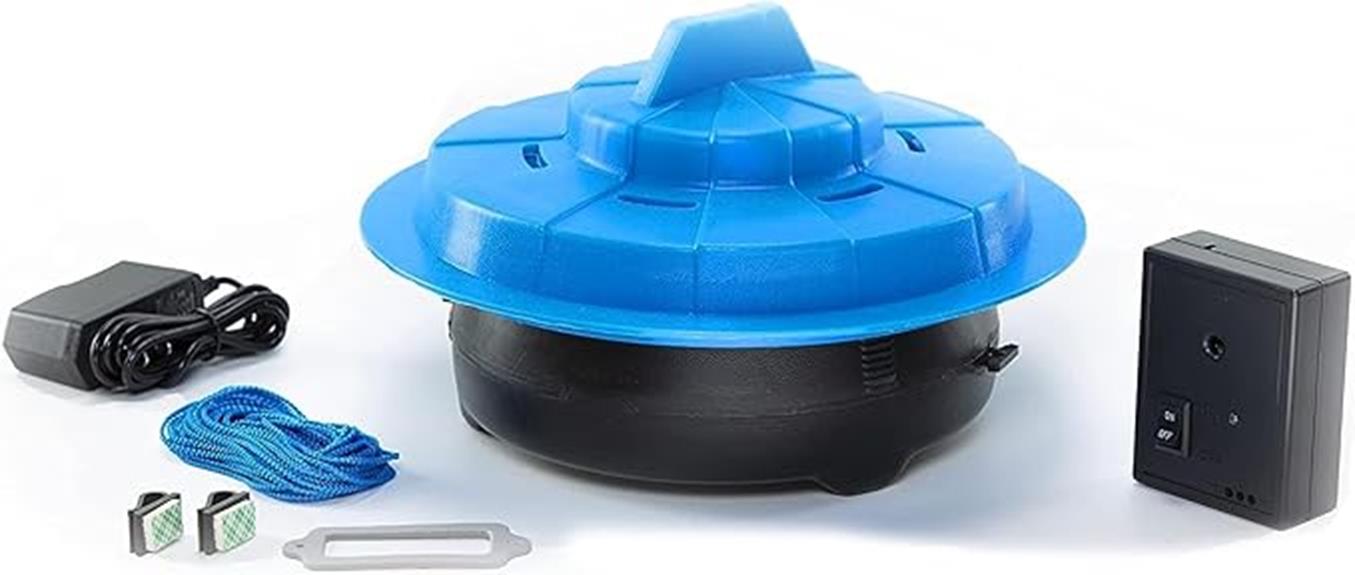
When it comes to keeping children safe around the pool, the Pool Alarm certified to ASTM F2208 stands out as a top choice for parents. Weighing just 1 pound and designed for pools up to 20' x 40', it's easy to install and requires no drilling. The alarm triggers with objects weighing 15 lbs. or more, ensuring that both kids and pets are monitored effectively. With a loud alert of 85 dB, you can quickly respond to any safety concerns. While it has mixed reviews regarding reliability, its straightforward setup and adjustable sensitivity settings make it user-friendly. Just remember to remove it at night to avoid unnecessary alerts, and consider using an alkaline battery for peak performance.
Best For: Parents looking for an effective safety solution to monitor children and pets around the pool.
Pros:
- Easy to install with no drilling required, making it user-friendly.
- Loud 85 dB alert ensures quick response to safety concerns.
- Adjustable sensitivity settings help prevent false alarms.
Cons:
- Mixed reliability ratings, with reports of false alarms from some users.
- Concerns about waterproofing, with some units failing after water exposure.
- Instructions could be clearer, especially for non-English speakers.
BCONE® System Pool Alarm by Lifebuoy
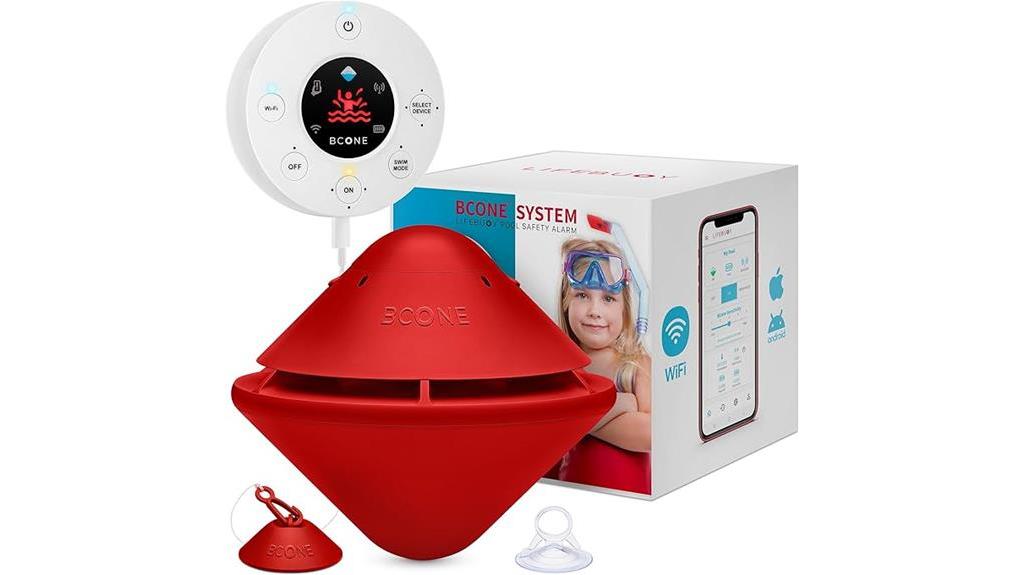
The BCONE® System Pool Alarm by Lifebuoy stands out as an exceptional choice for families with young children who prioritize safety. This certified ASTM F2208 floating pool alarm is versatile, working with both inground and above-ground pools. I love how it activates loud alarms at home, by the pool, and even through an app, ensuring I'm always alerted. The user-friendly app connects up to four pool safety float units, and there are no hidden subscription costs. Installation is straightforward, and the beacon detects movement within seconds. While some users mention occasional false alarms, overall, the ease of use and reliable notifications make this alarm a worthwhile investment for peace of mind around the pool.
Best For: Families with young children who prioritize pool safety and want reliable alerts.
Pros:
- User-friendly app allows control of multiple safety float units without hidden subscription costs.
- Quick detection with alarms activating within seconds of movement in the pool.
- Durable design backed by a 3-year warranty, ensuring long-term use.
Cons:
- Some users experience false alarms due to water features or sensitivity settings.
- Connection difficulties reported when attempting to link multiple units.
- Mixed experiences with customer service responsiveness and warranty claims.
Pool Alarm Camera – Wifi + App Operated for Inground & Above Ground Pools
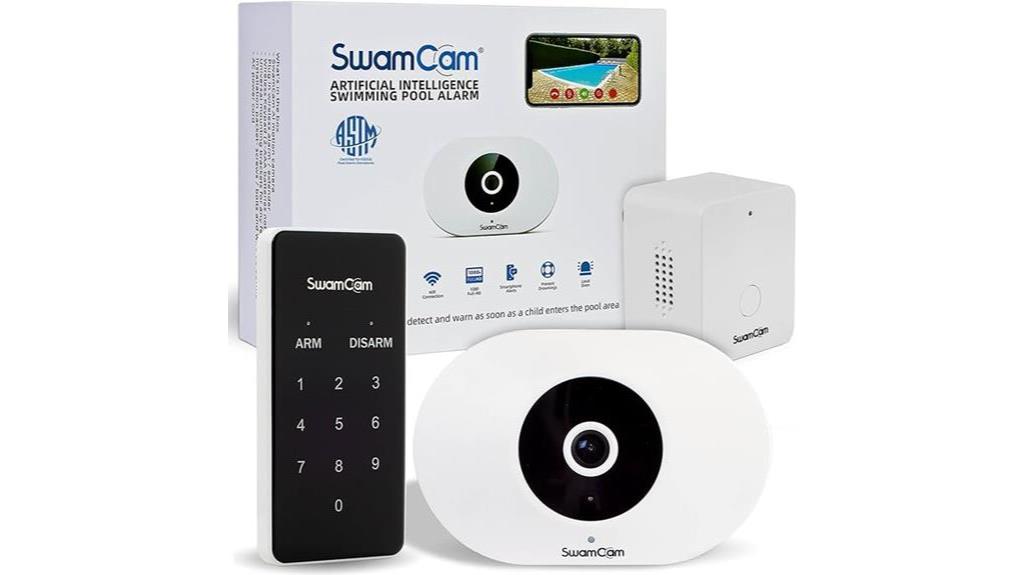
For parents seeking peace of mind, the SwamCam Pool Alarm Camera stands out as an essential safety tool for both inground and above ground pools. This ASTM F2208 certified device uses AI for human detection, alerting you before a child enters the pool. I love that it sends push notifications and emails with photos when someone breaches the customizable danger zones. The live stream in 1080p Full-HD lets me check in anytime, and the local alarm guarantees safety even without Wi-Fi. It's easy to install, and the auto re-arm feature adds another layer of protection. With responsive US-based tech support and a solid warranty, I feel secure knowing my family is protected by this innovative alarm system.
Best For: Parents seeking a reliable and advanced safety solution for their inground or above ground pools.
Pros:
- AI human detection alerts parents before a child enters the pool, enhancing safety.
- Live streaming in 1080p Full-HD allows for remote monitoring of pool activity.
- Responsive US-based tech support and a solid warranty provide peace of mind.
Cons:
- Some users report concerns about weather resistance and durability of the power cord.
- Requires two AAA batteries which are not included, adding to initial setup costs.
- Customizable danger zones may require frequent adjustments for optimal performance.
Pool Alarm for Inground & Above Ground Pools Wireless Connection
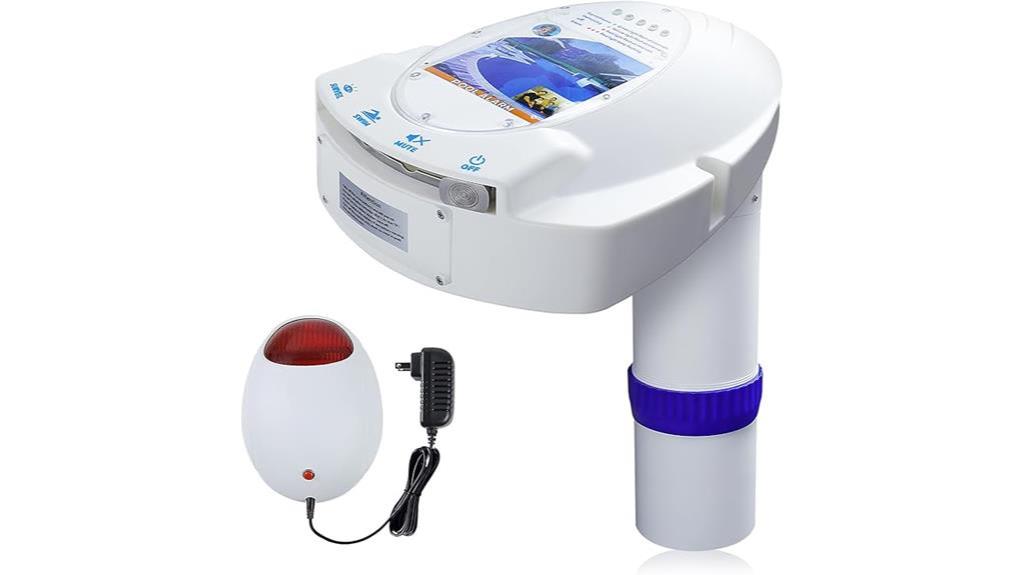
If you're looking for a reliable safety solution for your pool, the Pool Alarm for Inground & Above Ground Pools with a wireless connection stands out as an exceptional choice. This alarm system is designed for both children and pets, ensuring peace of mind while they enjoy the water. It features a water motion sensor that triggers an 85dB alarm if something over 13 pounds falls into your pool. I appreciate that it can be installed easily with adhesive or screws, and the remote unit can be placed up to 300 feet away. Plus, it offers adjustable settings to avoid false alarms when swimming. Overall, it's a solid investment in pool safety that I can confidently recommend.
Best For: Families with children and pets looking for a reliable safety solution for their swimming pool.
Pros:
- Loud 85dB alarm ensures immediate awareness in case of an emergency.
- Easy installation options with adhesive or screws and adjustable sensor tube for different water levels.
- Multiple modes of operation allow for customization and help prevent false alarms during swimming.
Cons:
- Some users report experiencing false alarms under certain conditions.
- Effectiveness may vary based on installation and environmental factors.
- Requires battery power for operation, which is not included in the package.
Poolguard PGRM-2 In-Ground Pool Alarm, White
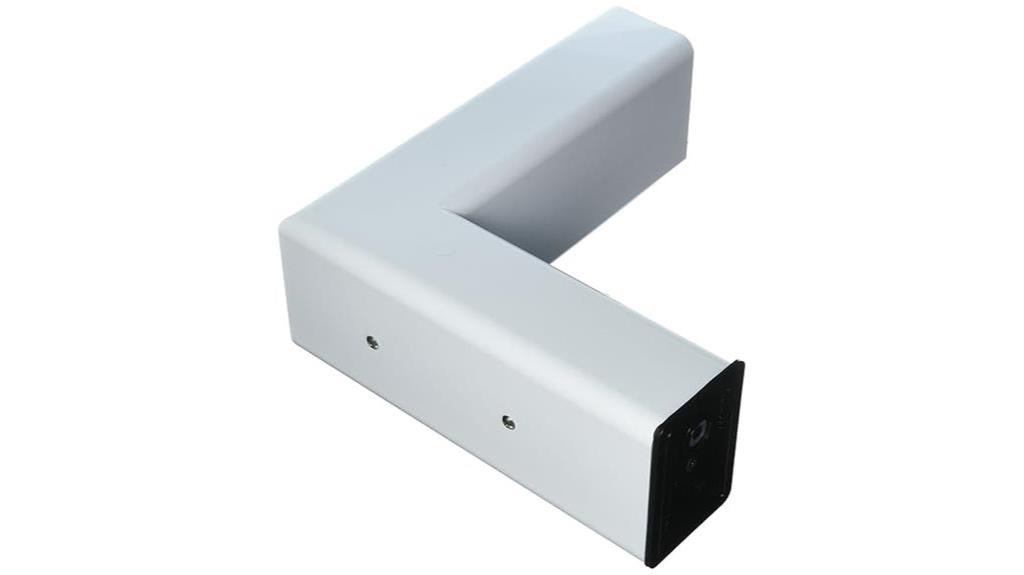
Looking for a reliable pool safety solution? The Poolguard PGRM-2 In-Ground Pool Alarm might be what you need. It's NSF Certified and designed for pools up to 800 square feet, so it covers a good range. I love that it comes with an in-house remote receiver that works up to 200 feet away. The 85-decibel alarm is loud enough to alert you quickly. However, I've noticed mixed reviews on its sensitivity; while some users report false alarms from wind, others feel secure. Installation is straightforward, but it requires a bit of practice for arming and disarming. Priced around $200, it's crucial to weigh the value against your specific needs and consider additional safety measures too.
Best For: Families looking for a reliable pool safety solution with a balance of features and affordability.
Pros:
- NSF Certified for safety and reliability, ensuring compliance with standards.
- In-house remote receiver with a range of up to 200 feet, enhancing convenience.
- Long battery life with approximately one year of usage, reducing maintenance frequency.
Cons:
- Mixed reviews regarding sensitivity, with some users experiencing false alarms.
- Installation requires practice for proper arming and disarming to avoid accidental activations.
- Pricing concerns, as some users feel it may be overpriced for its overall performance.
Factors to Consider When Choosing Pool Safety Alarms
When you're choosing a pool safety alarm, you need to take into account key factors like alarm sound level and installation ease. Detection sensitivity and battery life also play critical roles in making certain your pool remains safe. Don't forget to check for weather resistance to guarantee your alarm stands up to the elements.
Alarm Sound Level
In choosing a pool safety alarm, the sound level plays a vital role in guaranteeing quick responses to emergencies. Effective alarms typically produce noise levels of at least 85 dB at a distance of 10 feet, making it easier for nearby individuals to hear them. A higher decibel rating increases the likelihood of alerting people, especially in outdoor settings where ambient noise can drown out quieter sounds.
You might also want to take into account alarms with adjustable sound levels. This feature lets you customize the volume based on your specific needs and proximity to the pool area. Additionally, keep in mind that environmental factors like wind or rain can distort the alarm sound, potentially reducing its effectiveness.
To make certain your alarm remains reliable, it is important to perform regular tests of its sound level. This way, you can confirm it functions correctly and stays audible during critical situations. By prioritizing the sound level, you can enhance your family's safety and guarantee that everyone can respond quickly when it matters most.
Installation Ease
Sound level is just one aspect of choosing the right pool safety alarm; installation ease is equally important. You'll want an alarm that's simple to set up, as many models require no drilling or permanent modifications. This allows you to install the unit quickly and without hassle. Look for alarms that come with clear instructions, so you can successfully complete the installation without needing technical assistance.
Some models even use adhesive methods or just a simple button press to activate, making them accessible for those who may not have strong DIY skills. Additionally, adjustable sensitivity settings can help prevent false alarms, which can enhance usability during installation.
Another great feature is the ability to test the alarm system right upon installation. This immediate verification guarantees that everything is functioning correctly, giving you peace of mind before anyone uses the pool. Considering these factors will help you choose a pool safety alarm that's not only effective but also user-friendly. Ultimately, a straightforward setup process means you can focus more on enjoying your pool and less on complicated installations.
Detection Sensitivity
One essential aspect to contemplate in pool safety alarms is detection sensitivity, which determines how effectively the alarm senses the presence of individuals or objects in the water. Typically, this involves a weight threshold of around 15 lbs. or more to trigger the alarm. When choosing an alarm, consider models with adjustable sensitivity settings. This feature lets you customize the responsiveness, reducing false alarms caused by small animals or debris.
It's important to guarantee that the alarm can effectively detect quiet entries, especially for smaller children. If the sensitivity isn't calibrated correctly, it could pose a safety risk. Additionally, be aware that environmental factors like wind and water movement can impact the performance of detection sensitivity, potentially leading to more frequent false alarms.
Testing the sensitivity settings during installation is essential. This step guarantees the alarm works effectively, providing peace of mind without unnecessary disturbances during regular pool use. By paying attention to detection sensitivity, you can select a pool safety alarm that balances reliability and responsiveness, keeping your family safe while enjoying your pool.
Battery Life
When selecting a pool safety alarm, battery life plays a significant role in ensuring reliable operation throughout the swimming season. You'll want an alarm designed to last an entire season under normal conditions, so you don't have to worry about unexpected failures.
Many alarms operate on standard batteries, like 9-volt or AA, while others may use rechargeable batteries. This choice impacts convenience and maintenance, so consider what suits your lifestyle best. The average battery life can vary widely—some models last up to a year, depending on usage and environmental factors.
It's essential to check the type of battery recommended for your alarm. Alkaline batteries typically provide ideal performance and longevity compared to others. To avoid any surprises, make it a habit to regularly test and replace your batteries. This practice is especially important during peak usage times, like when children are swimming.
Weather Resistance
Choosing a pool safety alarm that can withstand the elements is fundamental for guaranteeing its reliability and longevity. Weather resistance plays a critical role, as exposure to rain and humidity can greatly affect the alarm's functionality and lifespan. You'll want to avoid alarms that have reported waterproofing issues since prolonged exposure to water can lead to failures, ultimately compromising safety.
To secure ideal performance, look for alarms that have been independently tested for reliability under various weather conditions. This testing can give you peace of mind that your investment won't falter during adverse weather. Additionally, consider alarms that include features like auto re-arm after a programmable time. This can enhance usability, especially in unpredictable weather scenarios where you might forget to reset the alarm.
Lastly, the durability of materials used in the alarm's construction is essential. Well-constructed units are more likely to withstand harsh weather without malfunctioning, guaranteeing that your family remains safe year-round. By focusing on these factors, you can confidently choose a pool safety alarm that meets both your safety needs and withstands the elements effectively.
Compatibility Features
After confirming your pool safety alarm can withstand various weather conditions, the next step is to assess its compatibility features. First, check if the alarm is suitable for your pool type—some designs cater specifically to inground or above-ground pools. This guarantees you have an effective safety solution tailored to your setup.
Next, consider alarms that integrate with smart home systems or apps. This feature allows you to receive instant alerts on your phone and control the alarm remotely, enhancing your peace of mind. If you have a larger pool or multiple pools, look for alarms that can connect to additional units, creating a thorough monitoring system.
Adjustable sensitivity settings are another important aspect. They help minimize false alarms triggered by pets or environmental factors, such as wind, ensuring the alarm remains reliable. Finally, verify the operational range of the alarm. Some models have limitations regarding how far away the receiver can be placed, so make sure it fits within your desired distance from the pool. By considering these compatibility features, you'll choose a pool safety alarm that effectively protects your family.
Frequently Asked Questions
How Often Should I Test My Pool Alarm?
You should test your pool alarm at least once a month to guarantee it's functioning properly. Additionally, check it after heavy rain or storms, as these conditions can affect its performance. If you've made any changes or repairs to your pool area, it's a good idea to test the alarm again. Regular maintenance not only keeps your family safe but also provides peace of mind knowing your safety measures are reliable.
Are Pool Safety Alarms Waterproof?
Think of pool safety alarms as your vigilant lifeguard, always on duty. Yes, most pool safety alarms are designed to be waterproof, ensuring they can withstand splashes and rain. However, it's crucial to check the specifications of your specific model. Some might have varying levels of water resistance. Regular maintenance and testing will help you keep your alarm in top shape, ready to protect your family whenever they're near the water.
Can Pool Alarms Be Used in Saltwater Pools?
Yes, pool alarms can be used in saltwater pools. Most modern pool alarms are designed to withstand the corrosive nature of saltwater, but it's always a good idea to check the manufacturer's specifications for compatibility. You'll want to verify that the alarm you choose is rated for saltwater use to avoid any issues. Regular maintenance and checks will help keep your alarm functioning properly in a saltwater environment.
What Is the Average Lifespan of a Pool Alarm?
When you install a pool alarm, you might expect it to last several years, but factors like usage and maintenance can affect its lifespan. On average, a pool alarm lasts around 3 to 5 years. For instance, if you live in a coastal area and frequently expose your alarm to saltwater, its lifespan could shorten considerably. Regular checks and prompt repairs can help you maximize its effectiveness and longevity, ensuring your family stays safe.
Do Pool Alarms Require Batteries or Electrical Power?
Pool alarms can operate on either batteries or electrical power, depending on the model you choose. If you prefer a battery-operated alarm, you'll enjoy the convenience of portability and easy installation. On the other hand, electrically powered alarms often provide continuous operation without the hassle of battery replacement. Be certain to check the specifications of the alarm you're considering to guarantee it fits your needs and lifestyle. Safety's worth the investment!
Wrapping Up
In the quest for pool safety, picking the perfect alarm is paramount. Prioritize protection by choosing a device that aligns with your family's needs and lifestyle. With options like the BCONE® System and Poolguard PGRM-2, you can create a secure swimming sanctuary. Remember, safety's not just a choice; it's a commitment. So immerse yourself in the decision-making process, and guarantee your pool paradise remains a safe haven for everyone. Stay vigilant, stay safe, and enjoy your summer splashes!